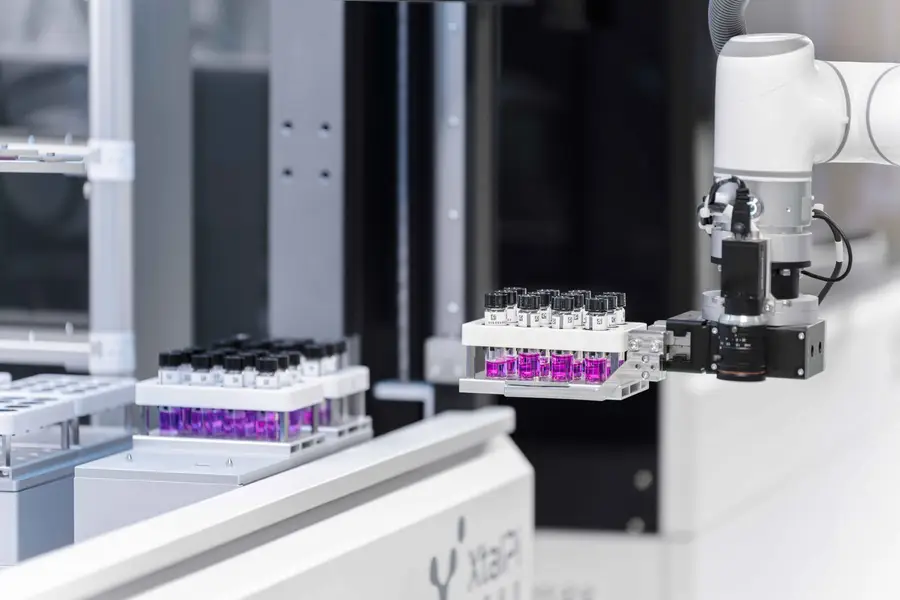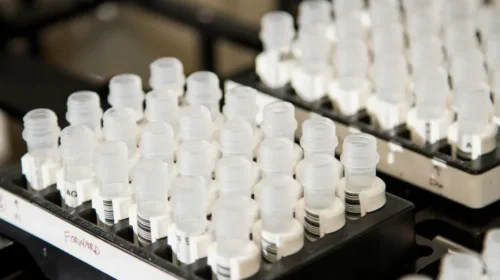XtalPi scores landmark deal for AI drug discovery

The biotech has partnered with U.S. firm DoveTree in a collaboration worth up to $5.99 billion, adding to a slew of major deals for Chinese research firms this year
Key Takeaways:
- XtalPi’s U.S. partner was founded by a celebrated Harvard scientist who has a track record in delivering viable drugs
- The deal, which was welcomed by investors, mostly consists of milestone payments, with upfront sums amounting to just $100 million
By Molly Wen
For Chinese drug research firms, 2025 is shaping up as the year of the mega deal.
Several drug discovery companies have signed licensing agreements with eye-popping headline figures for their promising prototypes that, if clinically successful, could be worth billions of dollars to the developers.
For example, 3SBio (1530.HK) signed over rights to an experimental cancer treatment based on a bispecific antibody to Pfizer for an initial $1.25 billion, setting a record for upfront payments for Chinese drug innovations, while Hengrui Pharma has entered a deal potentially worth $12 billion with GSK.
Now the specialized field of AI-enabled drug discovery is setting its own records.
On August5, XtalPi Holdings Ltd. (2228.HK) announced that U.S. drugs innovator DoveTree Medicines had signed up to use its integrated AI and robotics technology to develop candidate treatments for a range of diseases and conditions, from cancer to immune, metabolic and neurological disorders.
The agreement inked in late June amounts to around $5.99 billion in upfront and milestone payments, the biggest deal of its kind so far in the business of Artificial Intelligence Drug Discovery (AIDD).
The collaboration will focus on discovering and developing small-molecule and antibody candidates, with DoveTree gaining worldwide rights to resulting drugs.
The deal gives DoveTree access to XtalPi’s proprietary platform that combines artificial intelligence and robotic automation to accelerate drug discovery and development. The platform will be used to work on new drugs for previously hard-to-treat conditions based on targets selected by DoveTree. The U.S. partner’s founder, Harvard professor and pharmaceutical entrepreneur Gregory Verdine, has made it his firm’s mission to find ways to “drug the undruggable”.
In the statement, XtalPi said it had received an upfront payment of $51 million, with an additional $49 million due within 180 days of the signing, followed by up to $5.89 billion in potential sums linked to regulatory and commercial milestones. The Chinese firm also stands to receive a single-digit percentage of annual product sales as royalties. That adds up to a potential deal value of $5.99 billion.
The dazzling sum fired the imagination of investors. After the news, XtalPi’s stock surged nearly 23% in opening trade to reach its highest level in nearly six months. The share later pared its gains but closed 12.42% higher, taking the company’s market value close to HK$30 billion ($3.8 billion). The rally lost momentum and by August 8 the gain over three days had narrowed to 7.72%, before the stock began another ascent.
The credentials of the counterparty would have made an impression. DoveTree specializes in combining AI and other novel methods with a foundation in biological science. Verdine, an authority in chemical biology, has founded or co-founded more than a dozen biotech firms, five of which have gone public. Three drugs championed by him have been approved by U.S. medical regulators.
XtalPi’s CEO, Wen Shuhao, spoke of productive synergies that could help drive a paradigm shift in drug discovery. The Chinese firm’s platform combined with DoveTree’s development and commercial expertise could create a formula for breakthroughs in innovative medicine, he said.
Potential path to profits
The combined upfront payments of $100 million are just a small slice of the potential income of around $6 billion, but this type of deal structure is common for AI-driven drug discovery projects in the preclinical stage, which have a relatively low probability of commercial success. The true value is unlocked in stages, with large sums only changing hands when a product is shown to be clinically or commercially feasible.
XtalPi linked up with several other pharmaceutical companies this year. It expanded its strategic cooperation with Pfizer in late June to co-develop a molecular simulation platform. It also signed a deal worth 100 million yuan ($14 million) with PL Bioscience (000403.SZ) to conduct research into plasma products and other pharmaceuticals. XtalPi has also been active overseas, partnering to build an automated R&D laboratory for traditional medicines in the United Arab Emirates, billed as the first of its kind in the Middle East, with an initial investment of $30 million.
In June last year the Chinese biotech became the first company to list on the Hong Kong stock market under relaxed rules, known as Chapter 18C, for specialist technology firms. In its first year as a listed firm, XtalPi passed the revenue benchmark of HK$250 million to earn a market designation as a pre-commercial company.
XtalPi’s revenue jumped 53% to 266 million yuan in 2024 from the prior year, with an accelerated growth rate of 73% in the second half. Its adjusted net loss narrowed 12.5% to 457 million yuan from the 2023 figure. The intelligent robot business brought in around 163 million yuan while drug discovery made up the rest of the revenues, around 104 million yuan.
China Post Securities considered the prospects for XtalPi in a recent research report. With its integrated AI and robotics technology, the biotech could pile more big orders on top of its recent deals and act as a disruptor in the drug discovery business. For investors, it offers a specialist proposition in the AI arena and is on track to achieve profitability in 2027, the report said.
However, AI-enhanced methods have yet to produce a single commercial drug, and high hopes are already priced into XtalPi’s stock. The company trades at an elevated price-to-sales (P/S) ratio of 104 times. Another AI drug discovery company that filed for a Hong Kong IPO in May, InSilico Medicine, comes in with a lower valuation. Based on financial details in its prospectus, InSilico has an implied P/S ratio of approximately 15.5 times.
Although partners are keen to join hands with XtalPi, validating its technical prowess, the company’s stock has been volatile since the listing. Investor caution may be warranted.
To subscribe to Bamboo Works weekly free newsletter, click here





